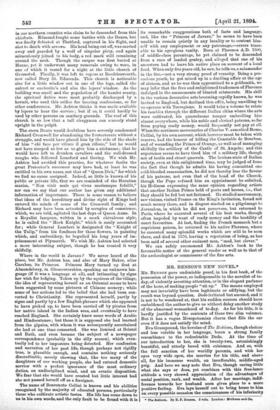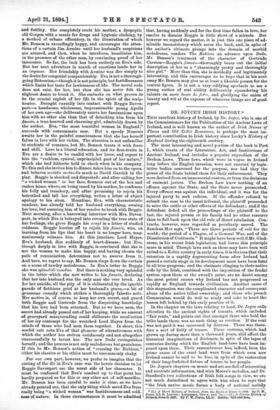MR. BENSON'S NEW NOVEL.*
Mn. BENSON gave undeniable proof, in his first book, of the- possession of the power, so indispensable to the novelist of to- day, of violently arresting attention, or in the elegant parlance of the hour, of making people "sit up." The means employed may not invariably have been legitimate or edifying, but the result was beyond question. Dodo irritated but amused, and it is not to be wondered at, that his sudden success should have emboldened the author to give us without delay another study of the abnormal womanhood of to-day. As for his title, it is. hardly justified by the contents of these two slim volumes. But it has a vague Mesopotamian charm that fills the ear even if it does not satisfy the mind.
Eva Grampound, the heroine of The Rubicon, though choicer and less voluble in her language, bears a strong family resemblance to the redoubtable Dodo. At the time of our introduction to her, she is twenty-two, astonishingly beautiful, and utterly bored with existence. And so, with the full sanction of her worldly parents, and with her eyes very wide open, she marries for his title, and above all, for his immense wealth, an insufferable, middle-aged prig. And here we may note that Eva, though caring little what she says or does, yet combines with this free-lance attitude a very shrewd appreciation of the advantages of social position, rank, and wealth. After her marriage, indif- ference towards her husband soon gives place to a more positive feeling. Eva lays herself out to bring home to him on every possible occasion the consciousness of his inferiority • 21w Rubicon. By B. P.Benson. 2 40i1. London:' Xethnon and Co. and futility. She completely routs his mother, a dyspeptic old Gorgon with a mania for drugs and hygienic clothing, by a method of urbane effrontery, in the illustration of which Mr. Benson is exceedingly happy, and encourages the atten- tions of a certain Tim Armine until her husband's suspicions are aroused, and then, when he interferes, humiliates him, in thepresence of the other man, by convincing proof of her innocence. So far, the luck has been entirely on Eva's side. But her next adventure in search of emotions lands her in an impasse. Her friendship with Armine was due simply to the desire for congenial companionship. Eva is not a thorough- going Bohemian,—though it is not principle, but fastidiousness which limits her taste for lawlessness of life. The moral code does not exist for her, but then she has never felt the slightest desire to break it. She embarks on what proves to be the crucial exploit of her life in the spirit of the scalp. hunter. Brought casually into contact with Reggie Daven- port—a handsome, wholesome, impressionable young Apollo of her own age—she deliberately exerts her fascinations upon him with no other aim than that of detaching him from his fiancée, a true-hearted and charming girl, admirably drawn by the author. Eva, "the most beautiful woman in England," succeeds with consummate ease. But a speedy Nemesis awaits her in the painful consciousness that she has herself -fallen in love with her victim. The situation is not unfamiliar to students of romance, but Mr. Benson treats it with force and skill. Love is a liberal education, and its first-fruits in Eva are a desire to be candid with her lover, and expose to him the "reckless, cynical, unprincipled part of her nature," which she had hitherto held in check when in his company. To this end she invites him to dinner, takes him on to the opera, and behaves mulatis mutandis much as David Garrick in the play. Reggie is shocked and disgusted; and after calling her 4' a wicked woman" to her face, flounces out of the box and rushes home, where, on being taxed by his mother, he confesses his folly and treachery, and after promising to rejoin his betrothed and tell her everything, writes a letter of abject apology to his siren. Meantime, Eva, with characteristic candour, has already told her husband everything, owning her love, but assuring him of her resolve to break with Reggie. Next morning, after a harrowing interview with Mrs. Daven- port, in which Eva is betrayed into revealing the true state of her feelings, she gives Reggie his conge in a letter of studied coldness. Reggie harries off to rejoin his fiancee, who, on learning from his lips that his heart is no longer hers, mag- nanimously releases him. At this juncture, Lord Hayes, Eva's husband, dies suddenly of heart-disease ; but Eva, though deeply in love with Reggie, is convinced that she is not the woman to make him happy, and having chosen the path of renunciation, determines not to swerve from it. And here, we regret to say, Mr. Benson rings down the curtain on a scene of tawdry melodrama. In Eva's letter to Reggie she was splendide mendax. But there is nothing very splendid in the letter which she now writes to his fiancée, declaring that her late husband was the only man she ever loved. As for her suicide, all the pity of it is obliterated by the ignoble parade of fictitious grief at her husband's grave,—a bit of gruesome comedy which strikes a thoroughly falsetto note. Her motive is, of course, to keep her own secret, and guard both Reggie and Gertrude from the disquieting knowledge that his love had been returned. But as we have seen, the secret had already passed out of her keeping, while no amount of graveyard masquerading could obliterate the recollection of her icy contempt for the wretched Lord Hayes from the minds of those who had seen them together. In short, this sordid exit robs Eva of that glamour of attractiveness with which the author has striven assiduously and not altogether unsuccessfully to invest her. The new Dodo extinguishes herself; and the process is not only malodorous but gratuitous. If this be Mr. Benson's notion of "crossing the Rubicon," either his classics or his ethics must be uncommonly shaky.
For our own part, however, we prefer to imagine that the casting of the die in Eva's case was the heroic decision to let Reggie Davenport see the worst side of her character. It must be confessed that Eva's conduct up to that point has hardly prepared US for this or any other act of self-sacrifice. Mr. Benson has been careful to make it clear, as we have already pointed out, that the only thing which saved Eva from really being "a wicked woman" was fastidiousness and cold- ness of nature. In these circumstances it must be admitted that, having suddenly and for the first time fallen in love, her resolve to dismiss Reggie is little short of a miracle. But however we regard the matter, it is just this one piece of ad- mirable inconsistency which saves the book, and, in spite of the author's ultimate plunge into the domain of morbid melodrama, renders The Rubicon an advance upon .Dodo. Mr. Benson's treatment of the character of Gertrude Carston—Reggie's fiancée—thoroughly bears ott the initial description of her as a "charmingly pretty and thoroughly nice girl." More than this, she is decidedly and legitimately interesting, and this encourages us to hope that in his next essay Mr. Benson may give us at least a likeable person for the central figure. It is not a very edifying spectacle to see a young author of real ability deliberately squandering his talents on mere tours de force, and glorifying the union of beauty and wit at the expense of whatever things are of good report.



































 Previous page
Previous page